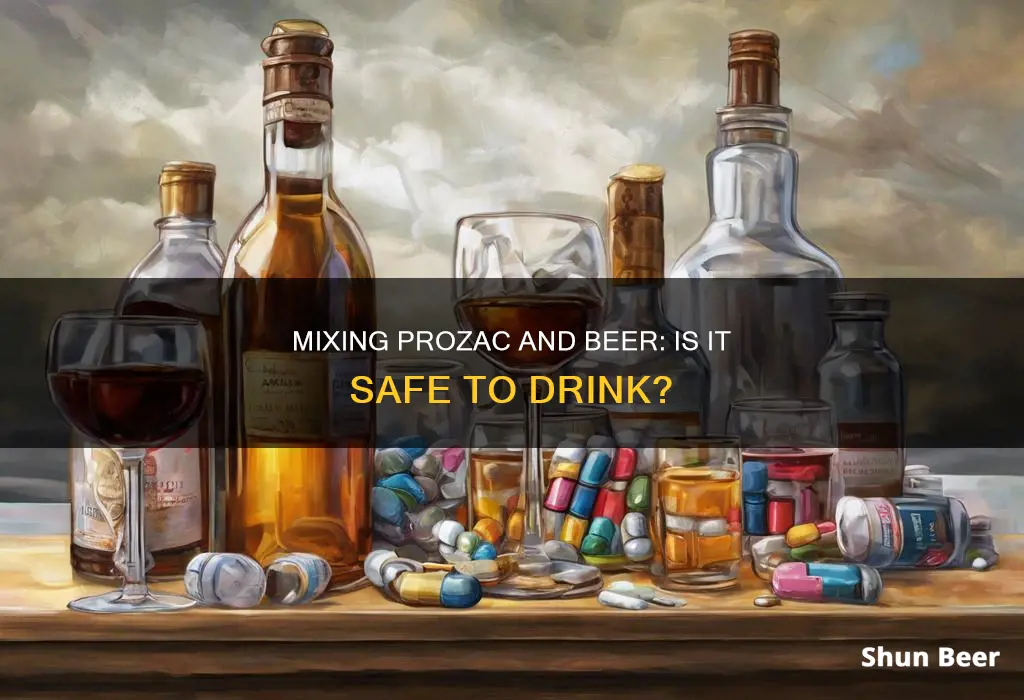
Prozac is a well-known antidepressant that has been prescribed for over 30 years. It is often used to treat mental health issues such as depression, anxiety, and obsessive-compulsive disorder. While Prozac is considered safe and effective, it may have side effects such as drowsiness, nervousness, and sexual dysfunction. These side effects can be amplified when mixed with alcohol, which is also a central nervous system depressant. Mixing Prozac and alcohol can lead to serious health issues, including impaired motor functions, an increased risk of overdose, and worsened mental health symptoms. Therefore, it is generally recommended to avoid drinking alcohol while taking Prozac.
| Characteristics | Values |
|---|---|
| Should you drink a few beers with Prozac? | No, it is not recommended to mix Prozac with alcohol. |
| Prozac's function | Prozac is a brand name for the active ingredient fluoxetine, a selective serotonin reuptake inhibitor (SSRI) that increases serotonin levels in the brain. |
| Alcohol's function | Alcohol is a depressant that impacts brain function and slows down or blocks messages within the brain. |
| Side effects of mixing Prozac and alcohol | Increased sedation, confusion, irregular heart rate, seizures, gastrointestinal issues, mood swings, agitation, and suicidal thoughts. |
| Prozac's effect on alcohol dependence | Prozac may help alcohol-dependent people abstain from drinking alcohol, but it is typically used after alcohol has left the body. |
| Alcohol's effect on Prozac's effectiveness | Alcohol can decrease the effectiveness of Prozac in treating depression, anxiety, and panic disorders. |
What You'll Learn

Prozac and alcohol can cause increased sedation
Prozac and alcohol do not mix well together. Both substances can change your brain chemistry, and when combined, they can amplify each other's side effects.
Prozac is a brand name for the active ingredient fluoxetine, a selective serotonin reuptake inhibitor (SSRI). It is an antidepressant that works by inhibiting the uptake of the neurotransmitter serotonin in your brain, helping to control your mood and behaviour. One of the common side effects of Prozac is tiredness.
Alcohol is a depressant that impacts your brain function. It slows down and even blocks messages within your brain, causing problems such as impaired judgement and decreased motor skills. Alcohol also has an effect on serotonin levels in the body.
When Prozac and alcohol are mixed, the side effects of both substances are worsened. The combination can lead to increased sedation, even if only a small amount of alcohol is consumed. This can result in poor decision-making, impaired driving, and an increased risk of falls and injuries. It can also lead to other side effects such as sudden fatigue and weakness, and feelings of hopelessness.
In addition, alcohol can interfere with the effectiveness of Prozac, as it may keep the medication from working to its full potential. This can make the symptoms of your condition worse.
Therefore, it is recommended that you avoid drinking alcohol while taking Prozac. If you have strong urges to drink, it is important to discuss these feelings with your doctor.
After-work beer: A harmless habit or a slippery slope?
You may want to see also

Mixing Prozac with alcohol can lead to poor decision-making
Prozac is a brand name for the active ingredient fluoxetine. It is an antidepressant medication that belongs to a class of drugs called selective serotonin reuptake inhibitors (SSRIs). SSRIs work by preventing the brain from reabsorbing serotonin, a neurotransmitter that regulates mood and behaviour, thereby increasing its availability in the brain.
Alcohol, on the other hand, is a central nervous system (CNS) depressant that slows down bodily functions. It can cause trouble thinking, impaired judgment, trouble hearing and seeing, and decreased motor skills.
- Increased Sedation and Drowsiness: Prozac and alcohol can both cause tiredness and sedation. When combined, these effects can be amplified, leading to extreme drowsiness and sedation. This can impair judgment and decision-making abilities, increasing the risk of accidents, falls, and injuries.
- Intensified Side Effects of Prozac: Alcohol can interfere with the effectiveness of Prozac, causing an increase in its side effects. These side effects may include changes in eating habits, weight loss, general weakness, impaired coordination, concentration issues, and mood swings. The intensified side effects can impact an individual's ability to make decisions and carry out daily tasks.
- Worsening of Mental Health Symptoms: Alcohol can worsen the symptoms of mental health conditions that Prozac is prescribed to treat, such as depression and anxiety. Alcohol can induce or worsen depressive symptoms, increase anxiety, and trigger suicidal thoughts. When combined with Prozac, these effects may be amplified, leading to poor decision-making and impaired judgment.
- Increased Risk of Overdose: Mixing Prozac with alcohol can increase the risk of a Prozac overdose, which can have severe consequences, including seizures and irregular heart rate.
- Development of Serotonin Syndrome: Combining Prozac with alcohol can lead to the development of serotonin syndrome, a severe and potentially life-threatening drug reaction. It occurs due to an overproduction of serotonin in the brain and can result in digestive issues, fever, and seizures.
Beer and Augmentin: Safe Mix?
You may want to see also

Prozac and alcohol can cause impaired driving
Prozac, a commonly prescribed antidepressant, and alcohol can be a dangerous mix, leading to impaired driving. Prozac, or fluoxetine, is a selective serotonin reuptake inhibitor (SSRI) that helps control symptoms of depression, anxiety, and other mood disorders. While it is a widely used medication with relatively mild side effects, mixing it with alcohol can have serious consequences.
Prozac is designed to help calm a person's mood and one of its side effects is tiredness. Alcohol, on the other hand, is a depressant that impacts brain function, slowing down and blocking messages within the brain. When combined, Prozac and alcohol can lead to increased sedation and extreme drowsiness, even with a single drink. This can impair driving ability, leading to poor decision-making, slowed reaction times, and an increased risk of accidents.
The effects of mixing Prozac and alcohol can be dangerous and unpredictable. Even a small amount of alcohol can lead to negative interactions. These effects can occur even if alcohol is consumed hours after taking Prozac, as Prozac is a long-term medication that stays in the body for an extended period. The combination can also interfere with the effectiveness of Prozac, worsening symptoms of depression and anxiety.
The potential risks of impaired judgment and cognitive function associated with Prozac and alcohol are taken seriously by law enforcement and the legal system. Individuals charged with driving under the influence of Prozac may face legal consequences, including fines, probation, mandatory counseling, and license suspension. It is crucial for individuals taking Prozac to be aware of how the medication may affect their ability to drive and to exercise caution.
In conclusion, mixing Prozac and alcohol can lead to impaired driving due to the enhanced sedative and drowsiness effects of the combination. It is essential for individuals taking Prozac to refrain from drinking alcohol to ensure their safety and well-being, as well as to maintain the effectiveness of the medication.
The Magic of Beer Bread: How Does It Work?
You may want to see also

Prozac and alcohol can worsen symptoms of depression
Prozac and alcohol do not mix well together. Both substances can alter brain chemistry, and when combined, they can amplify each other's side effects, leading to short and long-term health risks.
Firstly, alcohol is a depressant, so drinking it when you have depression can worsen your symptoms. It can even cause depressive symptoms in people who do not have clinical depression. Alcohol can also keep Prozac from working as effectively as it should. This means you won't get the full benefits of Prozac, and your symptoms may worsen.
Secondly, Prozac and alcohol can both cause sedation and tiredness. When combined, this can lead to intense feelings of sedation and fatigue, even with a small amount of alcohol. This can be dangerous, as it can lead to poor decision-making, impaired driving, and an increased risk of falls and injuries.
Thirdly, mixing Prozac and alcohol can lead to other side effects, such as feelings of hopelessness, which may increase the risk of suicidal thoughts and tendencies. It can also cause liver or kidney issues and blood sugar irregularities.
Finally, combining Prozac and alcohol can be fatal, as it increases the likelihood of a fatal overdose.
Therefore, it is essential to avoid drinking alcohol while taking Prozac. If you have strong urges to drink, talk to your doctor. There are many safe and effective ways to treat depression without resorting to alcohol.
Neoprene Beer Coolers: How Do They Work?
You may want to see also

Prozac and alcohol can cause fatigue and weakness
Prozac (fluoxetine) is a selective serotonin reuptake inhibitor (SSRI) that is used to treat depressive disorder, obsessive-compulsive disorder, panic disorder, and bulimia. It is meant to be taken daily and for a prolonged period to be effective.
Alcohol is a depressant that impacts brain function. It slows down and even blocks messages within the brain, causing problems such as impaired judgment, trouble hearing and seeing, and decreased motor skills.
Combining Prozac and alcohol can lead to increased sedation and extreme drowsiness, even with a small amount of alcohol. This is because both substances can cause tiredness and interfere with coordinated movement and alertness. The combination may result in dangerous situations, such as poor decision-making, impaired driving, and an increased risk of falls and injuries.
Additionally, mixing Prozac and alcohol may cause sudden fatigue and weakness, interfering with an individual's ability to finish simple tasks and requiring them to take frequent breaks to rest. This effect can further worsen the symptoms of the condition being treated, as the individual may not be able to fully benefit from the medication.
Therefore, it is recommended to avoid drinking alcohol while taking Prozac. If there are strong urges to drink, it is important to discuss these feelings with a doctor.
Passengers and Beer: Drinking Laws You Need to Know
You may want to see also
Frequently asked questions
It is not recommended to drink alcohol while taking Prozac. Combining the two can amplify the side effects of both substances, leading to increased sedation, confusion, irregular heart rate, seizures, and other potential symptoms. Additionally, alcohol can reduce the effectiveness of Prozac in treating depression, anxiety, and panic disorders.
Mixing Prozac and alcohol can lead to several side effects, including increased sedation, impaired judgment, mood swings, agitation, suicidal thoughts, digestive issues, and the development of serotonin syndrome, a severe and potentially life-threatening drug reaction.
It is recommended to consult a healthcare provider to determine when it is safe to consume alcohol after stopping Prozac. In most cases, it can take up to 30 days for the body to reset to natural serotonin levels and overcome the effects of Prozac.







